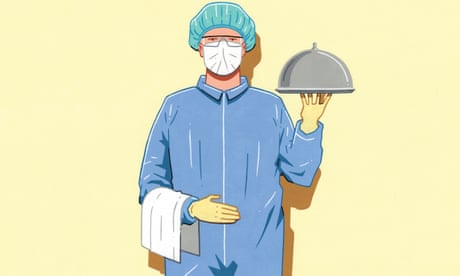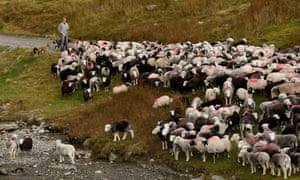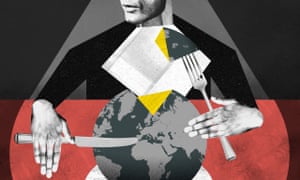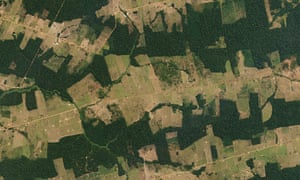What will future generations, looking back on our age, see as its monstrosities? We think of slavery, the subjugation of women, judicial torture, the murder of heretics, imperial conquest and genocide, the first world war and the rise of fascism, and ask ourselves how people could have failed to see the horror of what they did. What madness of our times will revolt our descendants?
There are plenty to choose from. But one of them, I believe, will be the mass incarceration of animals, to enable us to eat their flesh or eggs or drink their milk. While we call ourselves animal lovers, and lavish kindness on our dogs and cats, we inflict brutal deprivations on billions of animals that are just as capable of suffering. The hypocrisy is so rank that future generations will marvel at how we could have failed to see it.

The shift will occur with the advent of cheap artificial meat. Technological change has often helped to catalyse ethical change. The $300m deal China signed last month to buy lab-grown meat marks the beginning of the end of livestock farming. But it won’t happen quickly: the great suffering is likely to continue for many years.
The answer, we are told by celebrity chefs and food writers, is to keep livestock outdoors: eat free-range beef or lamb, not battery pork. But all this does is to swap one disaster – mass cruelty – for another: mass destruction. Almost all forms of animal farming cause environmental damage, but none more so than keeping them outdoors. The reason is inefficiency. Grazing is not just slightly inefficient, it is stupendously wasteful. Roughly twice as much of the world’s surface is used for grazing as for growing crops, yet animals fed entirely on pasture produce just one gram out of the 81g of protein consumed per person per day.
A paper in Science of the Total Environment reports that “livestock production is the single largest driver of habitat loss”. Grazing livestock are a fully automated system for ecological destruction: you need only release them on to the land and they do the rest, browsing out tree seedlings, simplifying complex ecosystems. Their keepers augment this assault by slaughtering large predators.

‘Sheep supply around 1% of our diet in terms of calories. Yet they occupy around 4m hectares of the uplands.’ Photograph: Murdo MacLeod for the Guardian
In the UK, for example, sheep supply around 1% of our diet in terms of calories. Yet they occupy around 4m hectares of the uplands. This is more or less equivalent to all the land under crops in this country, and more than twice the area of the built environment (1.7m hectares). The rich mosaic of rainforest and other habitats that once covered our hills has been erased, the wildlife reduced to a handful of hardy species. The damage caused is out of all proportion to the meat produced.
Replacing the meat in our diets with soya spectacularly reduces the land area required per kilo of protein: by 70% in the case of chicken, 89% in the case of pork and 97% in the case of beef. One study suggests that if we were all to switch to a plant-based diet, 15m hectares of land in Britain currently used for farming could be returned to nature. Alternatively, this country could feed 200 million people. An end to animal farming would be the salvation of the world’s wildlife, our natural wonders and magnificent habitats.
Now it is time for a new revolution, almost as profound as those other great shifts: the switch to a plant-based diet.
Understandably, those who keep animals have pushed back against such facts, using an ingenious argument. Livestock grazing, they claim, can suck carbon out of the atmosphere and store it in the soil, reducing or even reversing global warming. In a TED talk watched by 4 million people, the rancher Allan Savory claims that his “holistic” grazing could absorb enough carbon to return the world’s atmosphere to pre-industrial levels. His inability, when I interviewed him, to substantiate his claims has done nothing to dent their popularity.
Similar statements have been made by Graham Harvey, the agricultural story editor of the BBC Radio 4 serial The Archers – he claims that the prairies in the US could absorb all the carbon “that’s gone into the atmosphere for the whole planet since we industrialised” – and amplified by the Campaign to Protect Rural England. Farmers’ organisations all over the world now noisily promote this view.
A report this week by the Food Climate Research Network, called Grazed and Confused, seeks to resolve the question: can keeping livestock outdoors cause a net reduction in greenhouse gases? The authors spent two years investigating the issue. They cite 300 sources. Their answer is unequivocal. No.
It is true, they find, that some grazing systems are better than others. Under some circumstances, plants growing on pastures will accumulate carbon under the ground, through the expansion of their root systems and the laying down of leaf litter. But the claims of people such as Savory and Harvey are “dangerously misleading”. The evidence supporting additional carbon storage through the special systems these livestock crusaders propose (variously described as “holistic”, “regenerative”, “mob”, or “adaptive” grazing) is weak and contradictory, and suggests that if there’s an effect at all, it is small.
Replacing the meat in our diets with soya spectacularly reduces the land area required per kilo of protein: by 70% in the case of chicken, 89% in the case of pork and 97% in the case of beef. One study suggests that if we were all to switch to a plant-based diet, 15m hectares of land in Britain currently used for farming could be returned to nature. Alternatively, this country could feed 200 million people. An end to animal farming would be the salvation of the world’s wildlife, our natural wonders and magnificent habitats.
Now it is time for a new revolution, almost as profound as those other great shifts: the switch to a plant-based diet.
Understandably, those who keep animals have pushed back against such facts, using an ingenious argument. Livestock grazing, they claim, can suck carbon out of the atmosphere and store it in the soil, reducing or even reversing global warming. In a TED talk watched by 4 million people, the rancher Allan Savory claims that his “holistic” grazing could absorb enough carbon to return the world’s atmosphere to pre-industrial levels. His inability, when I interviewed him, to substantiate his claims has done nothing to dent their popularity.
Similar statements have been made by Graham Harvey, the agricultural story editor of the BBC Radio 4 serial The Archers – he claims that the prairies in the US could absorb all the carbon “that’s gone into the atmosphere for the whole planet since we industrialised” – and amplified by the Campaign to Protect Rural England. Farmers’ organisations all over the world now noisily promote this view.
A report this week by the Food Climate Research Network, called Grazed and Confused, seeks to resolve the question: can keeping livestock outdoors cause a net reduction in greenhouse gases? The authors spent two years investigating the issue. They cite 300 sources. Their answer is unequivocal. No.
It is true, they find, that some grazing systems are better than others. Under some circumstances, plants growing on pastures will accumulate carbon under the ground, through the expansion of their root systems and the laying down of leaf litter. But the claims of people such as Savory and Harvey are “dangerously misleading”. The evidence supporting additional carbon storage through the special systems these livestock crusaders propose (variously described as “holistic”, “regenerative”, “mob”, or “adaptive” grazing) is weak and contradictory, and suggests that if there’s an effect at all, it is small.
The best that can be done is to remove between 20% and 60% of the greenhouse gas emissions grazing livestock produce. Even this might be an overestimate: a paper published this week in the journal Carbon Balance and Management suggests that the amount of methane (a potent greenhouse gas) farm animals produce has been understated. In either case, carbon storage in pastures cannot compensate for the animals’ own climate impacts, let alone those of industrial civilisation. I would like to see the TED team post a warning on Savory’s video, before even more people are misled.
As the final argument crumbles, we are left facing an uncomfortable fact: animal farming looks as incompatible with a sustained future for humans and other species as mining coal.
That vast expanse of pastureland, from which we obtain so little at such great environmental cost, would be better used for rewilding: the mass restoration of nature. Not only would this help to reverse the catastrophic decline in habitats and the diversity and abundance of wildlife, but the returning forests, wetlands and savannahs are likely to absorb far more carbon than even the most sophisticated forms of grazing.
The end of animal farming might be hard to swallow. But we are a resilient and adaptable species. We have undergone a series of astonishing changes: the adoption of sedentarism, of agriculture, of cities, of industry.
Now it is time for a new revolution, almost as profound as those other great shifts: the switch to a plant-based diet. The technology is – depending on how close an approximation to meat you demand (Quorn seems almost indistinguishable from chicken or mince to me) – either here or just around the corner. The ethical switch is happening already: even today, there are half a million vegans in the land of roast beef. It’s time to abandon the excuses, the fake facts and false comforts. It is time to see our moral choices as our descendants will.

